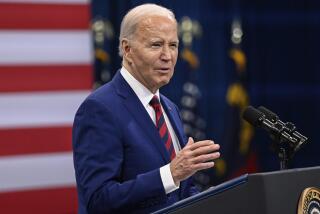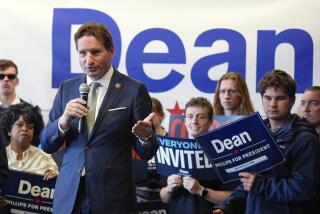Edwards Takes a Close Second in Wisconsin
- Share via
MILWAUKEE — John F. Kerry scratched out a victory Tuesday in the Wisconsin primary, but John Edwards finished close enough to emerge as a serious challenger to the Democratic front-runner and to effectively boot Howard Dean from the race.
The former Vermont governor came in a distant third, and a top campaign aide said early today that Dean will stop campaigning. The aide said that Dean would not formally drop out of the race so that his supporters could continue to vote for him in upcoming contests. Dean wants to have a voice at the Democratic National Convention in July, the aide said.
The Dean campaign scheduled an announcement today in Burlington, Vt.
Although Kerry padded his winning record -- now 15 victories in 17 contests -- the showing by Edwards cracked the door to at least the possibility of a fight for the nomination.
Tuesday night, both Sen. Kerry of Massachusetts and Sen. Edwards of North Carolina declared victory, one far more enthusiastically than the other.
“I want to thank so many across Wisconsin and America who have given this campaign their help and their hearts,” a subdued Kerry told a crowd of supporters outside Madison, the state capital. “Tonight I say to all of America: Get ready. A new day is on the way.”
Unlike past election nights, marked by exuberant, overflow audiences, there was room to spare at the Kerry victory celebration, with the dampened spirit matching his sober tone.
By contrast, Edwards was ebullient as he addressed supporters at a community hall in Milwaukee.
He pumped his fists and held up the arm of his wife, Elizabeth, as the crowd cheered and confetti rained.
He enjoyed a laugh at the expense of the pollsters and pundits who forecast a Kerry blowout.
“Today, the voters of Wisconsin sent a clear message,” Edwards said. “The message was this: Objects in your mirror may be closer than they appear.”
Edwards had spent a week in Wisconsin and campaigned more aggressively than Kerry, who arrived Friday after taking two days off.
With the contest shifting to a national stage, that kind of up-close-and-personal campaigning becomes a luxury.
“That’s the biggest challenge that Edwards faces,” said Don Kettl, a political scientist at the University of Wisconsin in Madison. “Is it possible to successfully translate his face-to-face personalized campaigning to the mega-state, wholesale campaigning you need for Super Tuesday?”
On March 2, in less than two weeks, the Democratic candidates will be vying for 1,151 delegates in California and nine other states -- close to one-third of all those at stake in primaries and caucuses.
Wisconsin was the first stand-alone primary since New Hampshire’s vote three weeks ago, which is why candidates camped here for days and crossed paths on the campaign trail.
Edwards, who boasts of being a strong closer, appeared to benefit from a well-reviewed performance in Sunday night’s debate and an endorsement in the Milwaukee Journal Sentinel, the largest newspaper in the state. (The same thing happened last month in Iowa, where a convincing debate performance and a Des Moines Register endorsement helped lift Edwards to a second-place finish.)
Edwards’ emphasis on jobs and the economy, which proved important issues here, seemed to fuel his appeal with Wisconsin voters, according to exit polls.
“In Milwaukee, Green Bay, Sheboygan and a lot of small towns you’ve probably never heard of ... industries have just been moving out,” said Christian Grose, an assistant political science professor at Appleton’s Lawrence University.
“Everything Edwards was saying completely fit in with those sorts of concerns.”
In TV spots and appearances across the state, Edwards repeatedly condemned the 1994 North American Free Trade Agreement with Mexico and Canada, blaming the treaty -- as many here do -- for a significant loss of high-skilled, high-paying manufacturing jobs.
Kerry supported NAFTA, which Edwards began pointing out with increased frequency after long refusing to compare himself with the front-runner.
Edwards also began drawing a more personal contrast with Kerry and his privileged background by discussing his modest upbringing as the son of middle-class wage-earners.
That also seemed to resonate in a state where many Democrats live in small towns and rural areas.
Edwards signaled his intention to sharpen his rhetoric in satellite television interviews conducted Tuesday before the Wisconsin polls closed.
“I want people to know what the differences are between us,” he said. “I mean, I come from a different background than he does. I have new, fresh ideas about how we can change Washington.”
Wisconsin’s unusually open voting system also seemed to play a part in Edwards’ strong showing.
Anyone 18 years or older was eligible to vote, and exit polls showed that about 3 in 10 of those who cast ballots Tuesday were independents. Republicans made up about 1 in 10 voters, the most in any of the contests so far.
Edwards defeated Kerry by more than 2 to 1 among Republicans and had a double-digit lead among independents, reflecting results in earlier contests where Edwards ran strongest among more conservative voters.
Tuesday night, he seized on the results as evidence of his electability.
“I think it means I can beat George Bush,” Edwards said on CNN. “I believe the electorate is divided into a third Democrats, a third independents and a third Republicans. If we’re going to win the general election, we’re going to have to get independents.”
Some observers saw incipient signs of buyer’s remorse or, at the least, an indication that voters are not ready to wrap up the Democratic contest scarcely a month after it started.
Voters in later primary states “don’t want to be taken for granted,” said Charles Cook, an independent campaign analyst. “They hate to hear that the contest is over before they get a chance to vote.”
For Dean, his distant third-place finish dealt another serious blow to a campaign on a steady slide for weeks. Tuesday night, a reflective Dean addressed his followers in a hotel ballroom in Madison, thanking them for their support and trying to rally their spirits.
“I know that some of you are disappointed because we didn’t do as well as we had hoped we would do in Wisconsin, but I also want you to think for a moment about how far we have come,” he told the crowd of a few hundred.
He pledged to stay involved in efforts to politically energize ordinary Americans.
“We are not done yet,” Dean said repeatedly.
After losing in the first rounds of voting, he abruptly scrapped his efforts elsewhere and vowed to make a last stand here in Wisconsin, a state with a progressive tradition and a big liberal community centered around the University of Wisconsin in Madison.
But after putting out a fundraising plea that described Wisconsin as do-or-die, and raising more than $1.4 million in the process, the former governor changed his mind a few days later and suggested he would continue campaigning regardless of the outcome.
He sharpened his attacks on Kerry, assailing his collection of campaign donations from Washington’s corps of lobbyists and lawyers.
At one point, Dean suggested that Kerry the Democratic frontwas no different than Bush in his reliance on special-interest money.
But here, as elsewhere, Dean’s message never took hold. Instead, he created a distraction with his public musings over whether to continue or quit the race. He was equally inconsistent on the stump.
At Sunday’s debate, he passed up an opportunity to directly make his case against Kerry; at one point he defended the senator’s fundraising practices against charges raised in an attack ad by Bush.
By Monday’s final day of campaigning -- after his national campaign chairman defected to Kerry -- Dean was talking about his once high-flying candidacy in the past tense.
Cook said it was time for Dean to leave the race if he hoped to preserve his reputation and keep his political hopes alive.
“It’s not that he’s doing any harm to Kerry or the party, so much as it looks pointless and self-indulgent,” Cook said.
“He should drop out, show some stoicism, go on the late-night shows and start a rehabilitation effort aimed at getting into a [presidential] Cabinet or positioning himself for a future run.”
Times staff writers Nick Anderson and Maria L. La Ganga and staff researcher Susannah Rosenblatt contributed to this report.
*
*
(Begin Text of Infobox)
Primary Results
*
Wisconsin
John F. Kerry 40%
John Edwards 34%
Howard Dean 18%
Dennis J. Kucinich 3%
Al Sharpton 2%
99% reporting
Figures do not total 100% because fringe candidates and those who left the race are not listed.
*
Delegate count
Here is the breakdown of presidential preferences of delegates to the Democratic National Convention. It includes choices by “super delegates,” those not picked through primaries or caucuses and who can change their minds.
--
Needed to nominate: 2,162
Candidate; Delegates
John F. Kerry 608
Howard Dean 201
John Edwards 190
Al Sharpton 16
Dennis J. Kucinich 2
Source: Associated Press
More to Read
Get the L.A. Times Politics newsletter
Deeply reported insights into legislation, politics and policy from Sacramento, Washington and beyond. In your inbox twice per week.
You may occasionally receive promotional content from the Los Angeles Times.











